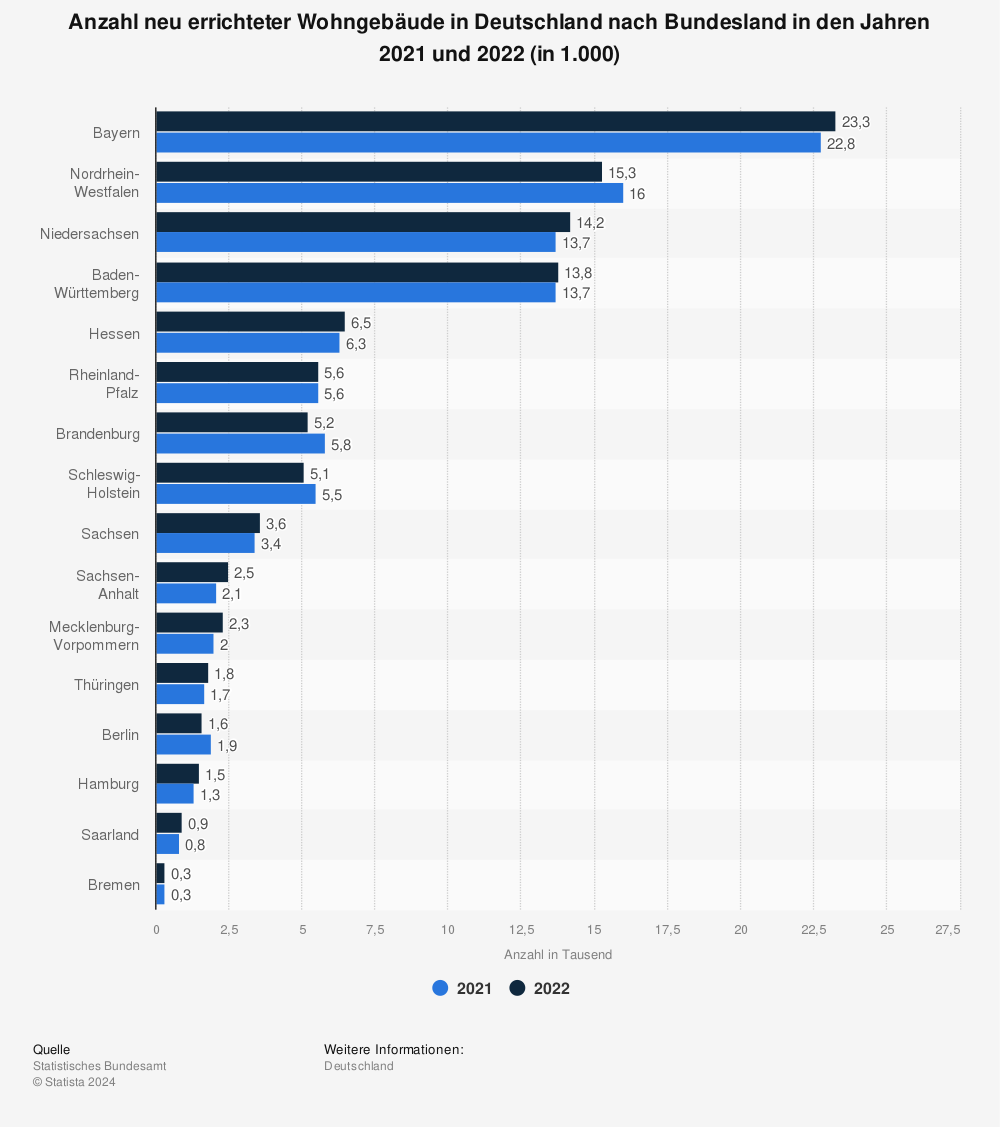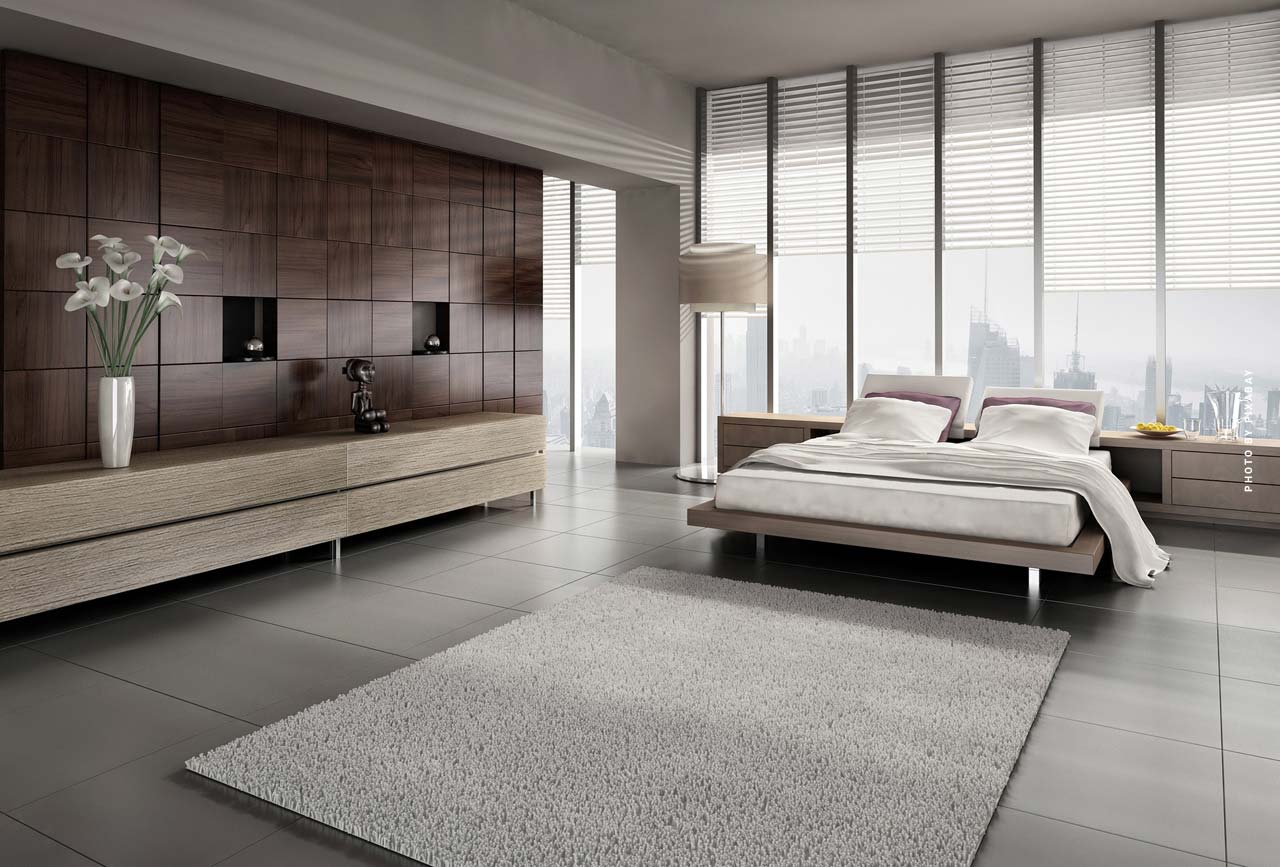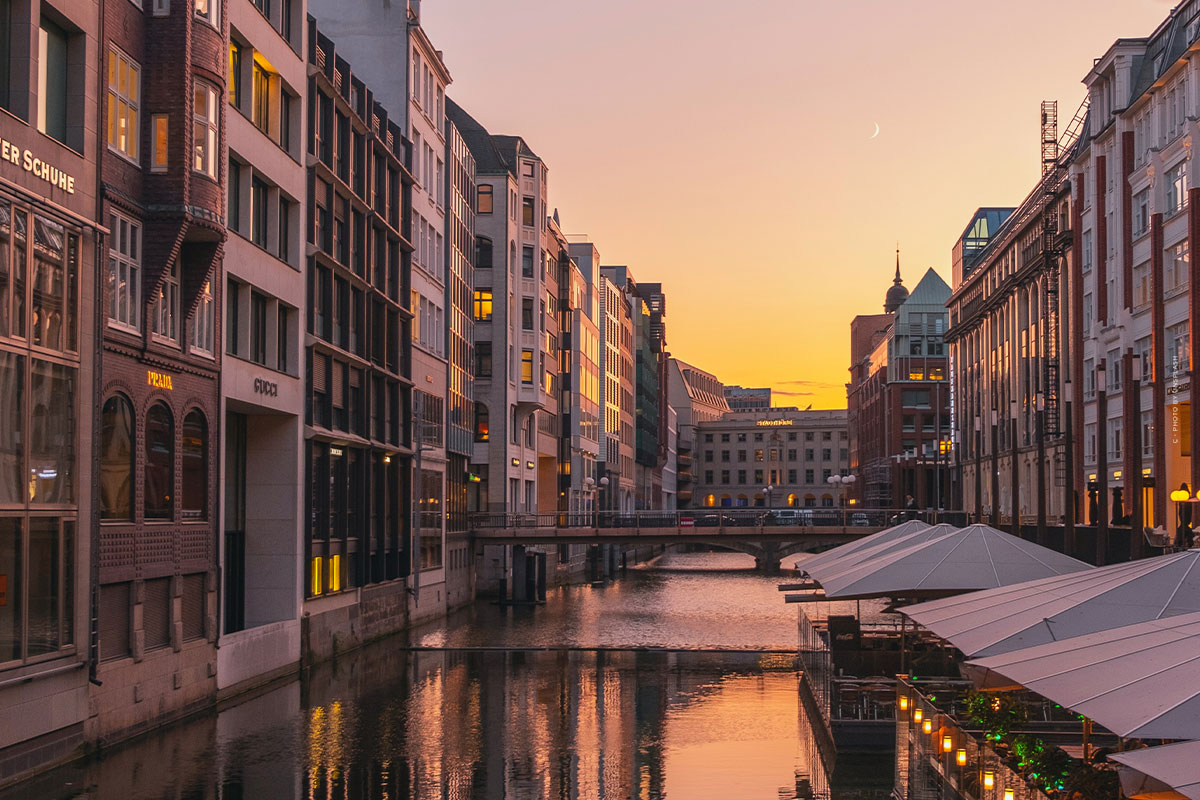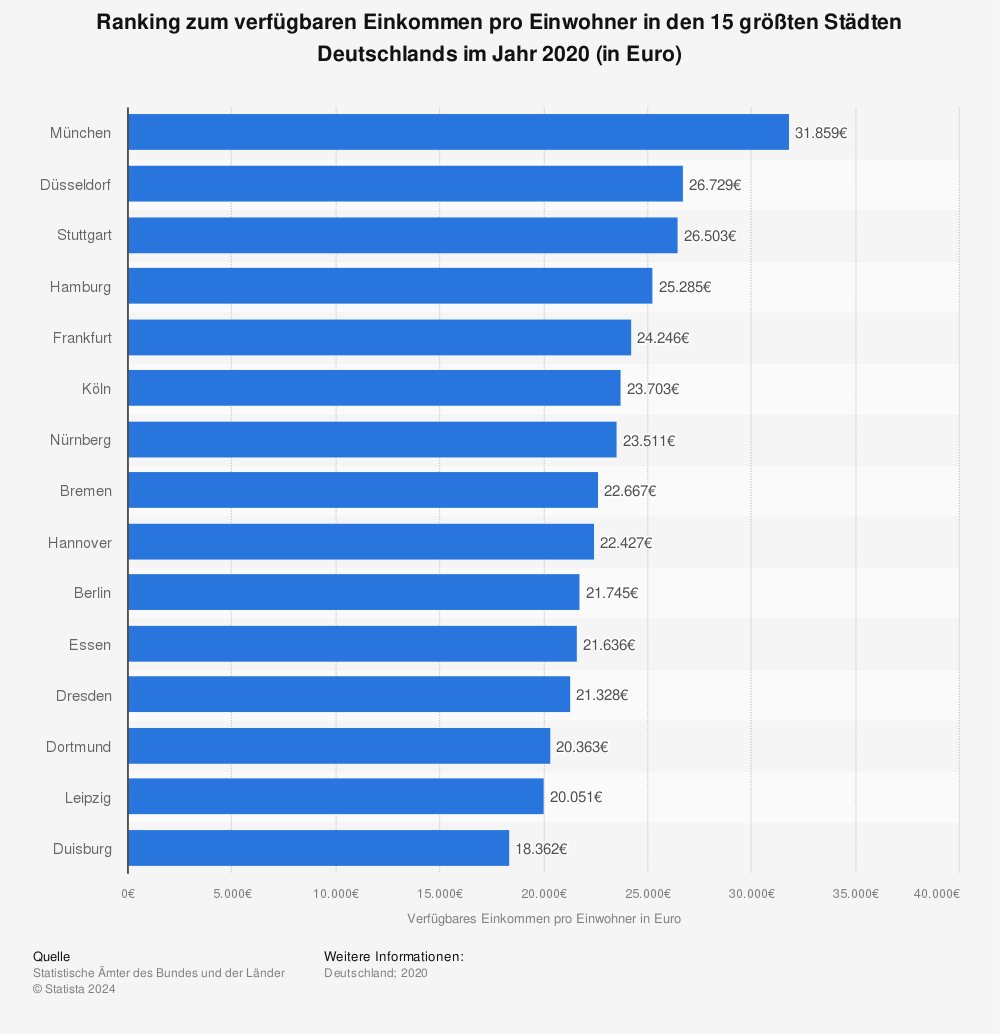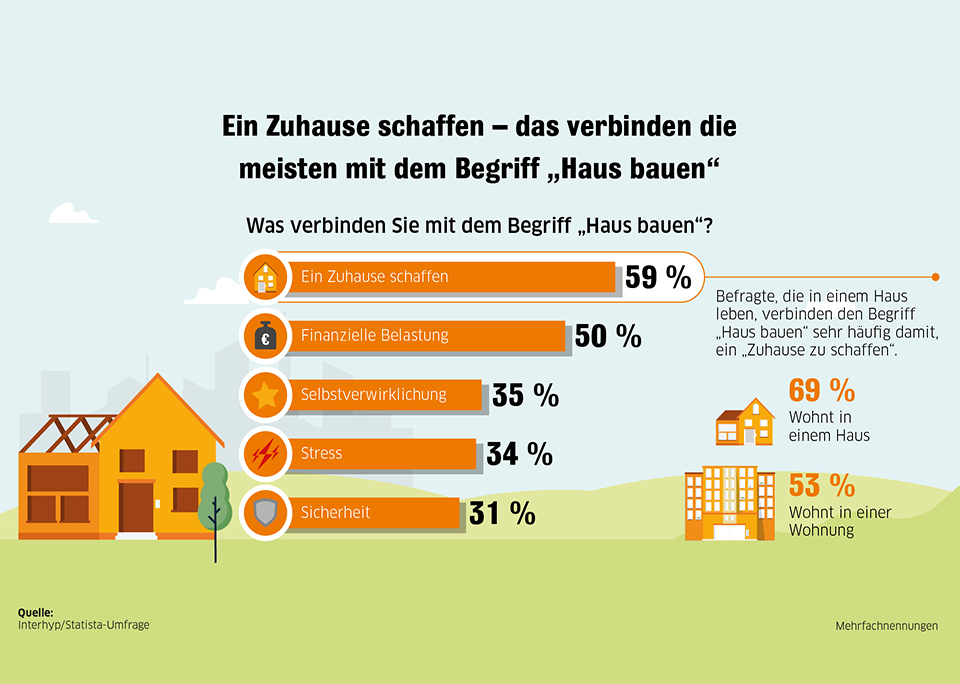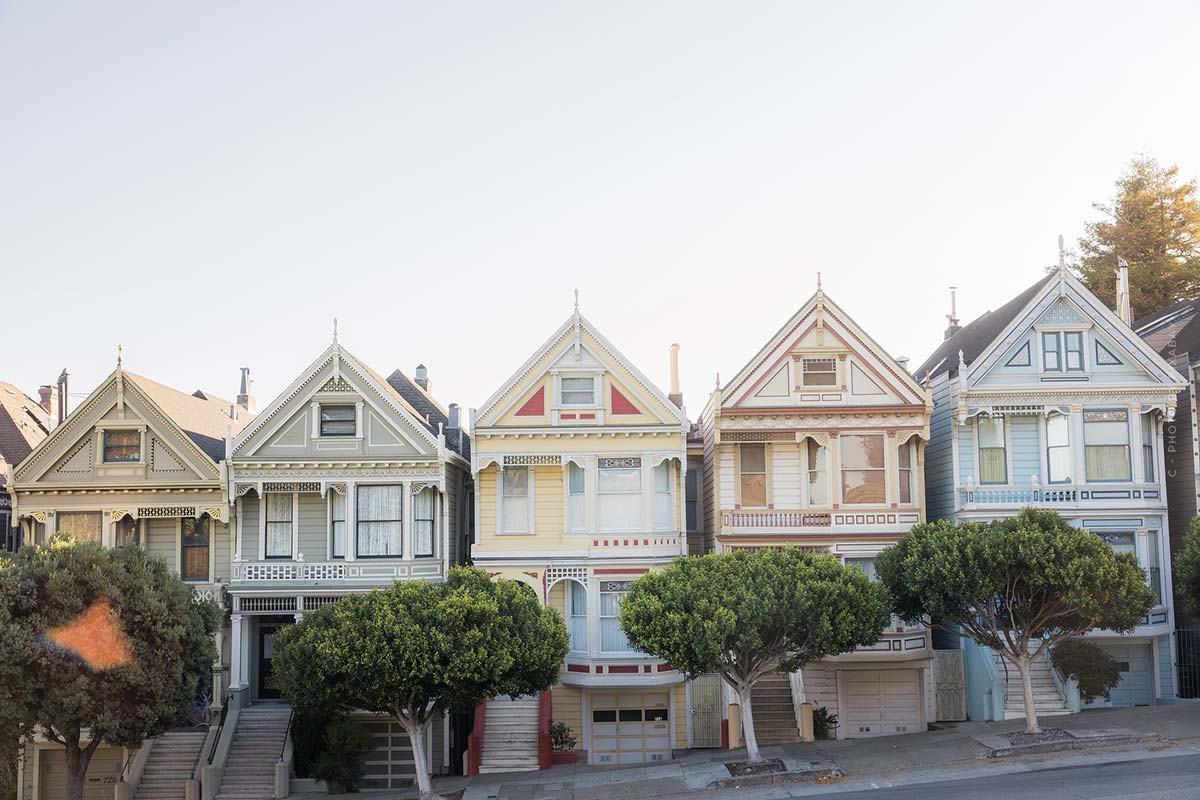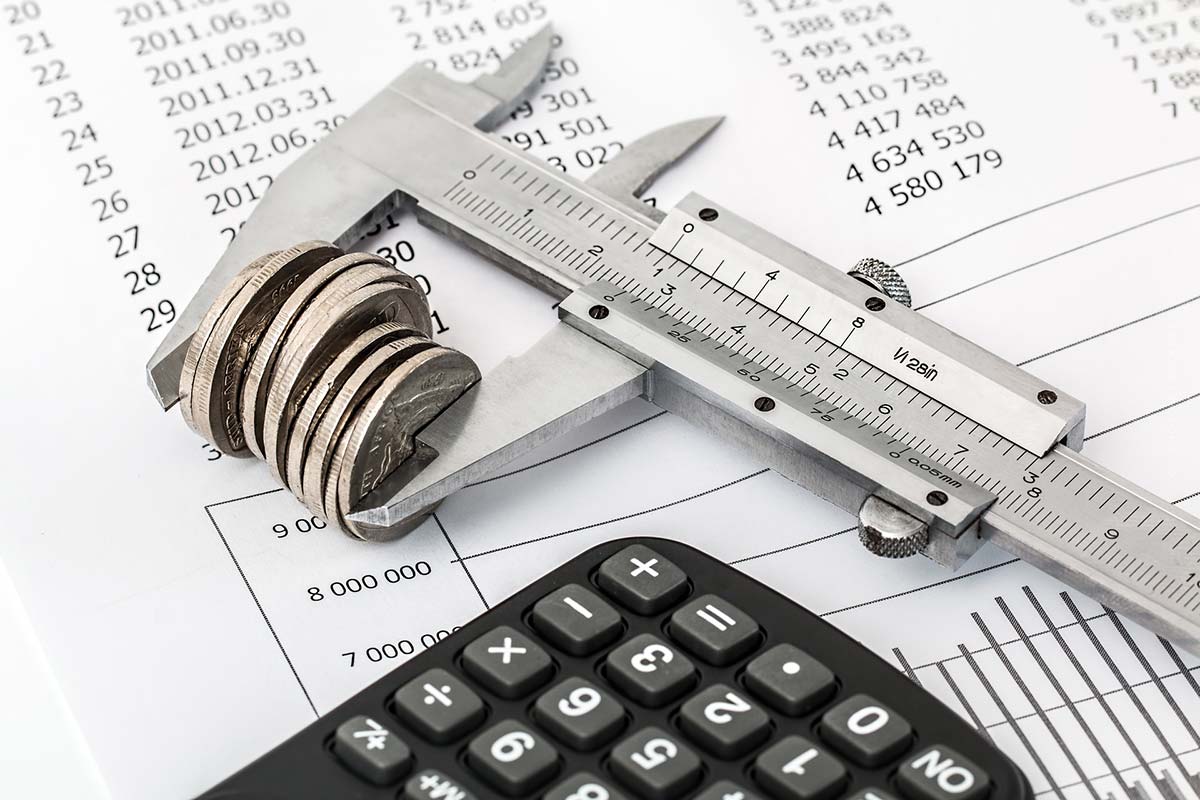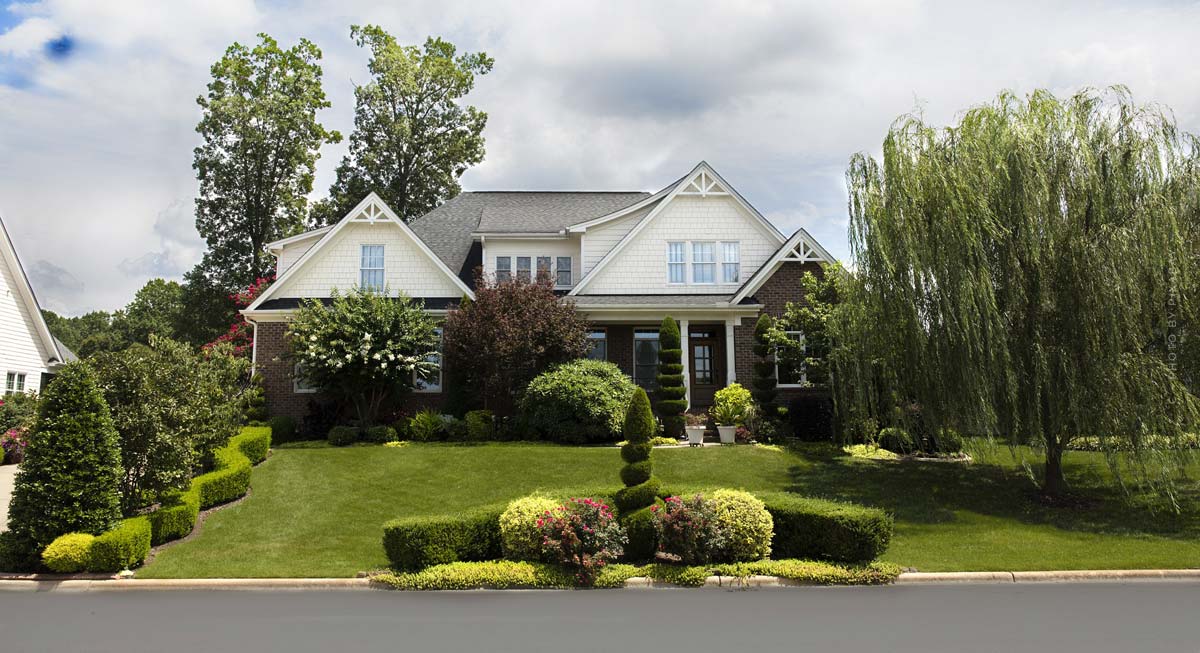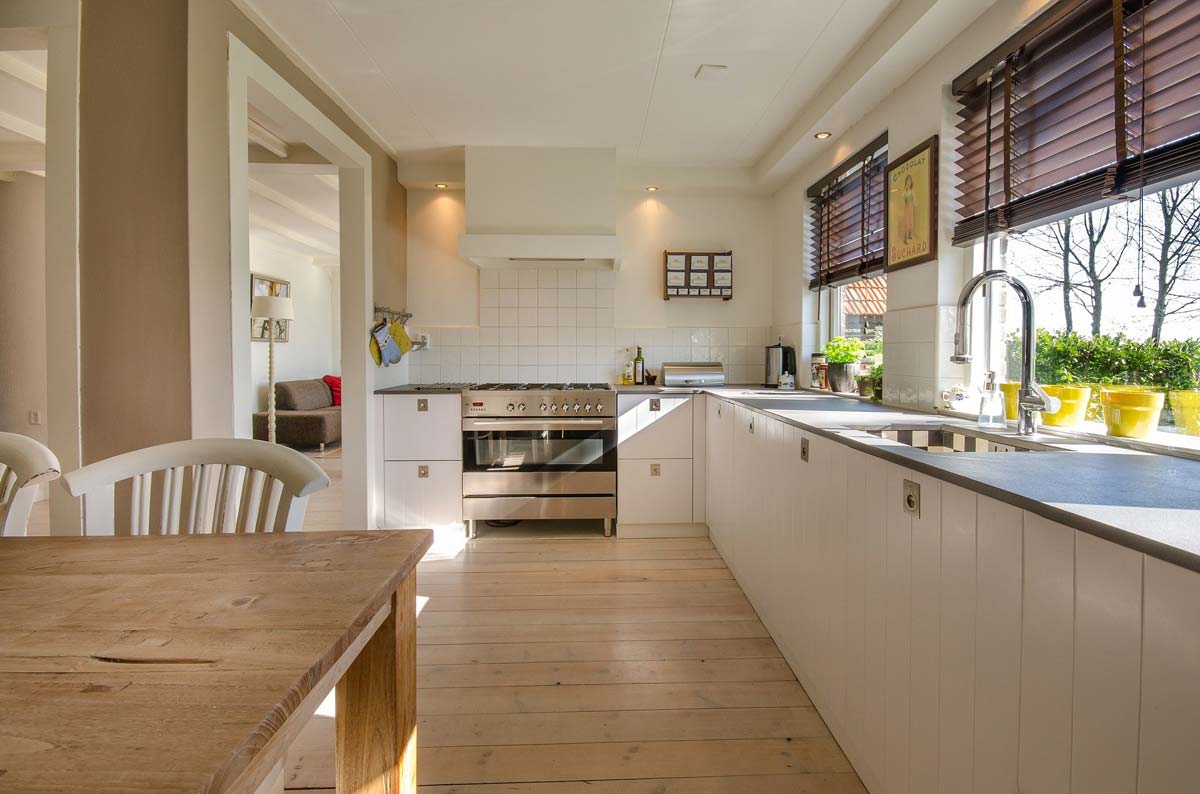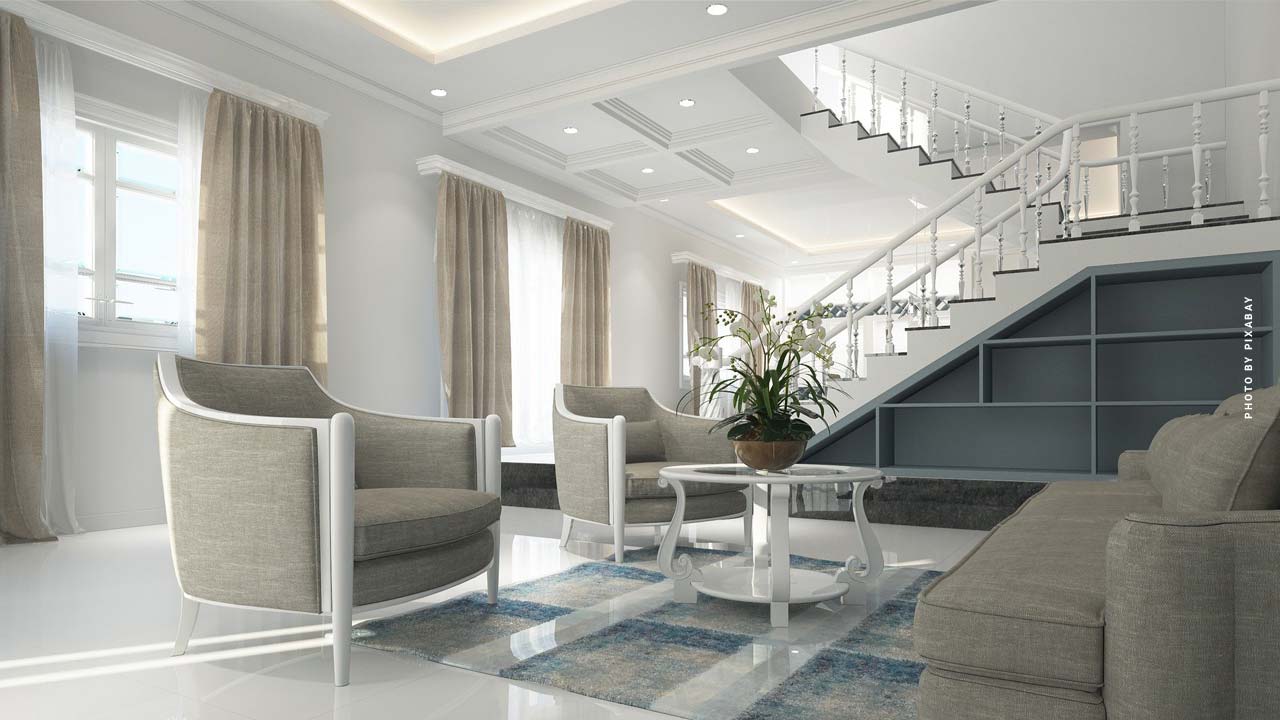Munich buy & rent: House, apartment, property – Square meter price
München Buy & Rent – Munich is the most expensive city in Germany. Square metre prices are rising for tenants and buyers. Even for building land, plots, condominiums, single-family homes and apartment buildings, the prices are rising. But with increasing prices, profits are also increasing for investors. We take a close look at the Munich property market, financing, buying tips and tips for tenants. Right at the beginning we start with buyers and our view on the price development. After the overview you will find the purchase price for newly built condominiums in Munich. From 2009 to 2019 the price per square meter for an ETW (new building) has increased from 3,400 Euro / square meter to 8,100 Euro / square meter. An increase of 4,700 euros / square meter, a whole + 138.2% in only 10 years. Will the situation remain tense? Read our analysis with current facts and figures.
If you’re looking to invest in Germany’s thriving real estate market, Lukinski has you covered. From guides to German inheritance law, tax optimization, additional costs and hidden purchase fees, renovation, and the list goes on. Want to delegate the work? As German real estate experts, we can be your man on the ground:
Germany’s Second City
Munich counts itself to one of Germany’s economic capitals. It is also famous for its high quality of life and surrounding nature. The alps for skiing or hiking, as well as countless lakes for summer activities, are all nearby, not to mention the italian coast just to the south. Nowadays it is Germany’s third-largest city with some 1,5 million inhabitants. It has a very low unemployment rate, strong technology and science sector, as well as increasing popularity for startups, not to mention its everstrong automotive and aviation industries.
Munich Real Estate Market Explained
Munich’s real estate sector is characterized by strong demand and low supply. This is also unlikely to change, with little construction being done within city limits. Munich is also the most expensive city for real estate in Germany. The average prices for single- or double-family residences are around €1.3 mil. (almost twice as high as any other city in Germany) and for apartments around €450.000, also higher than in any other city in Germany.

Buy or Rent in Munich?
If you’re thinking about investing in Munich’s real estate, the question about rent or buy is probably in focus. The recommendation here is clear: Buy or, when possible, build. In recent years, the development has been towards low interest rate on mortgages. This means you’re likely to lose money renting, as opposed to buying, when looking at one property. Furthermore, with the inner city filling up, and with the market extremely tense, the best option is likely to invest in the outer parts of the city. Comparing the buying price and yearly rent in these parts shows that the ratio here is good. Most importantly though, the price is increasing, meaning that your investment will likely pay off. In these regions you’ll find prices like:
- Buy: 5.600 €/m²
- Rent: 16,34 €/m²
Prices Layout for Residentials
With the go-to being near the outer parts of the city, and with Munich being a family-friendly city, the prices for single- or double-family residences give a good indication of the market. These are, in €/m²
- Very Good – €1.550.000-€16.000.000 (increasing)
- Good – €1.300.000-€3.100.000 (increasing)
- Mediocre – €700.000-€1.800.000 (increasing)
- Simple – €500.000-€1.300.000 (steady)
Buy in Munich
First we take a detailed look at current statistics for buyers. Here you will find a lot of information, from the purchase price for a newly built condominium to tips for renting property. We will also take a look at two important issues: buying in Munich and the danger of a real estate bubble Munich.
- Purchase price for newly built condominium
- Purchase price development since 2010
- Highest real estate loans in Munich
- Munich real estate bubble?
- Buy in Munich
- Number of sales of luxury homes
- Let the property
Munich’s city centre with its famous church.
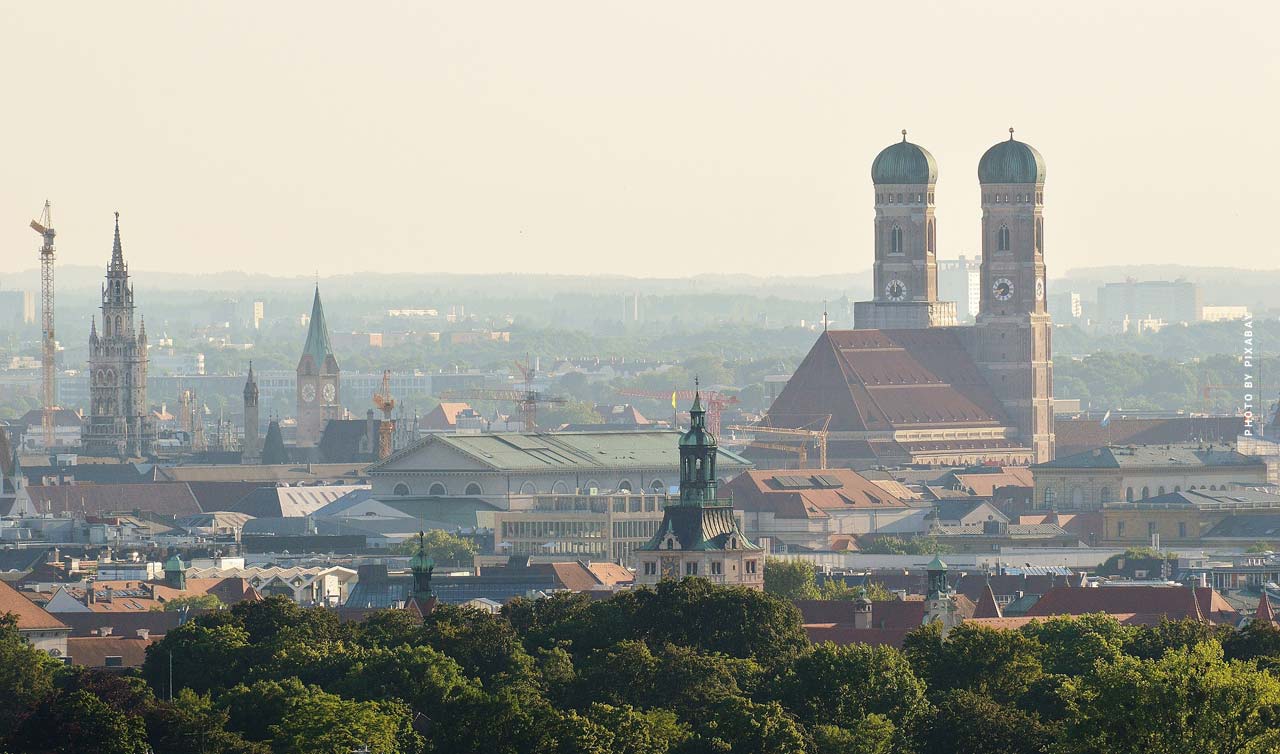
Purchase price for newly built condominium
Purchase price for newly constructed condominiums in Munich from 2009 to 2019 (in euros per square meter). From 2009 to 2019, the price per square metre for an ETW (new building) rose from 3,400 euros / square metre to 8,100 euros / square metre. An increase of 4,700 euros / square metre, a whole + 138.2% in just 10 years. Will the situation remain tense? Read our analysis with current facts and figures.

More statistics can be found at Statista
Purchase price development since 2010
Already 10 years ago Munich had a significantly higher price level for the purchase of real estate. The development continued. Here you can see a comparison of the purchase price of condominiums in Munich 10 years ago with the whole of Germany in the 1st quarter of 2010 and 2011 (in Euro per m²)
Munich
- Munich, cut: 3.538 Euro / square meter
- 1st quarter 2010: 3,396 euros / square meter
- Increase Q1 2011: 3,680 Euro / square meter
On average higher purchase price at the turn of the year 10 years ago:
+123.78 % purchase price (see Germany)
Germany (comparison)
- Germany, cut: 1,581 Euro / square meter
- 1st quarter 2010: 1,519 euros / square meter
- Increase Q1 2011: 1,643 Euro / square meter
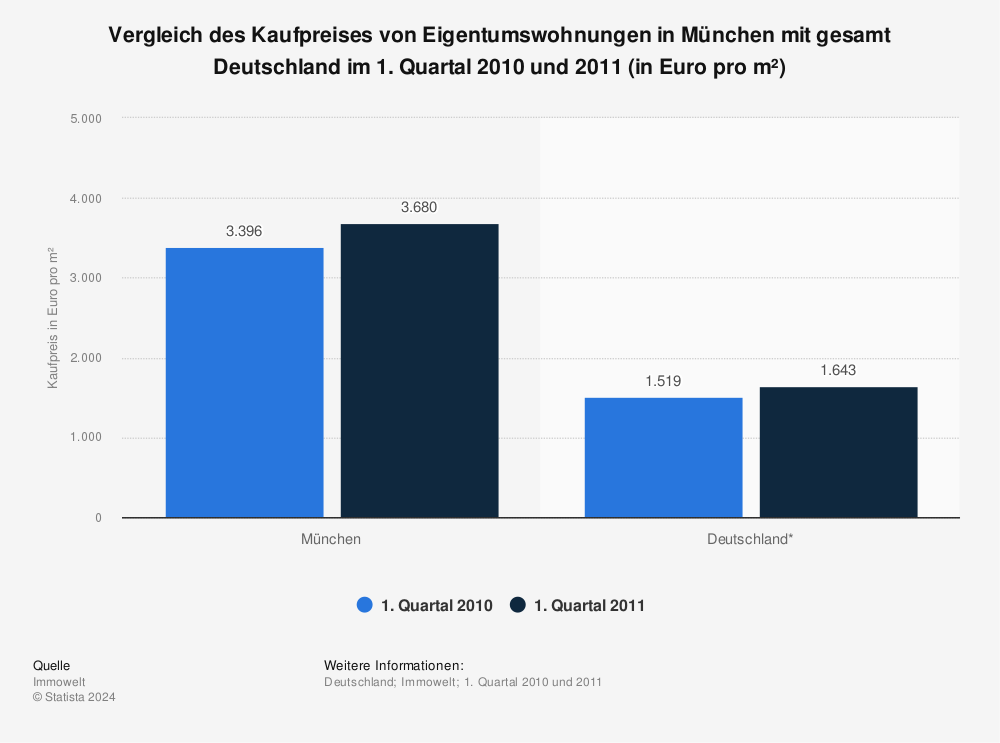
More statistics can be found at Statista
Buying in Bavaria since 2010
Purchase prices for residential real estate in Bavaria by cities in the first half of 2011 (in EUR 1,000).
- Seihenhaus (blue)
- One-family house (dark blue)
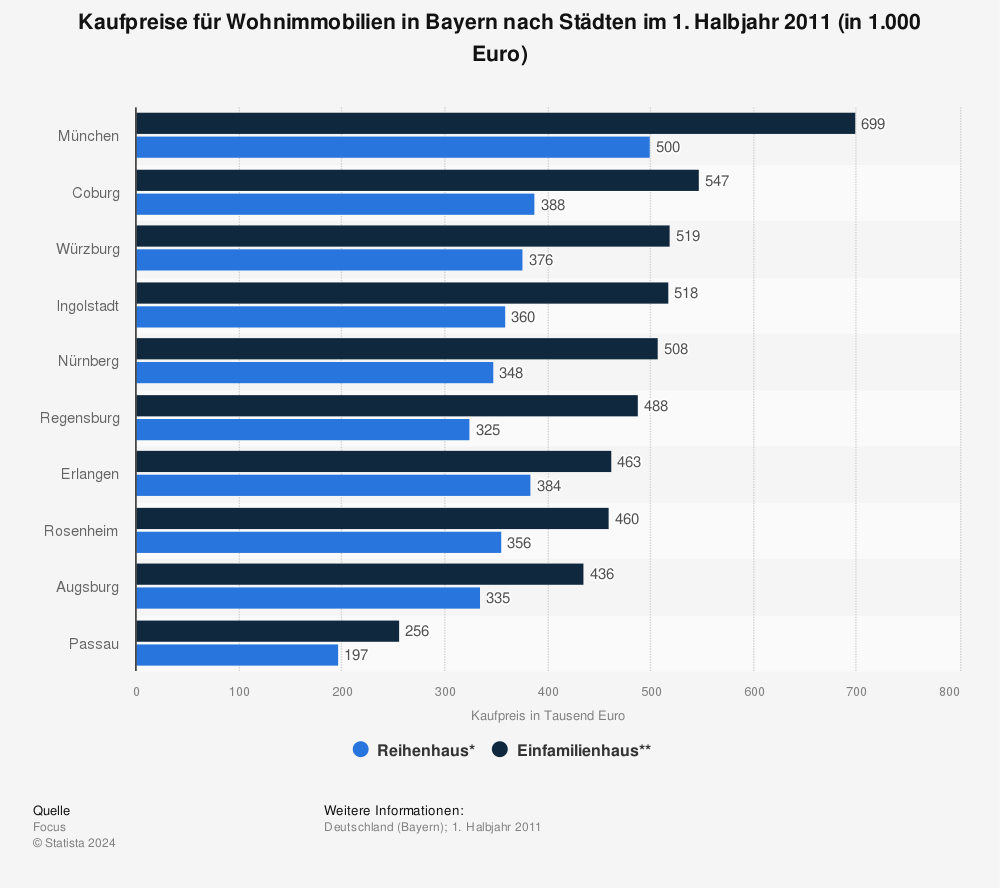
More statistics can be found at Statista
Highest real estate loans in Munich
The chart shows a ranking according to highest average mortgage loan in the 20 largest cities in Germany based on a current evaluation of the comparison platform Check24. Loans of 500,000 euros are compared here, for 101 square metres of living space.
- Munich – 504,000 Euros
- Frankfurt – 417,000 Euro
- Hamburg – 384,000 Euros
- …
 More statistics can be found at Statista
More statistics can be found at Statista
Real estate bubble Munich?
The chart shows the risk of a real estate bubble by index value in selected major cities worldwide. The UBS Global Real Estate Bubble Index places the real estate market in a long-term perspective and aims to track the risk of real estate bubbles in global cities. The index examined 24 major cities. Munich ranks first in the survey.
 More statistics can be found at Statista
More statistics can be found at Statista
Where is it worth buying? comparison
Where is it worth buying a property (house, semi-detached house, condominium, etc.)? In comparison, one sees the potential that lies dormant above all in NRW and Hessen. This chart shows the cost advantages of home ownership compared to rents in German metropolitan areas in 2018.
- Düsseldorf with 53.8%
- Cologne with 53.6%
- Frankfurt with 50.1%
- Stuttgart with 44.0%
- Leipzig with 41.8%
- Munich with 37.6%
- Hamburg with 35.0%
- Berlin with 26.9%
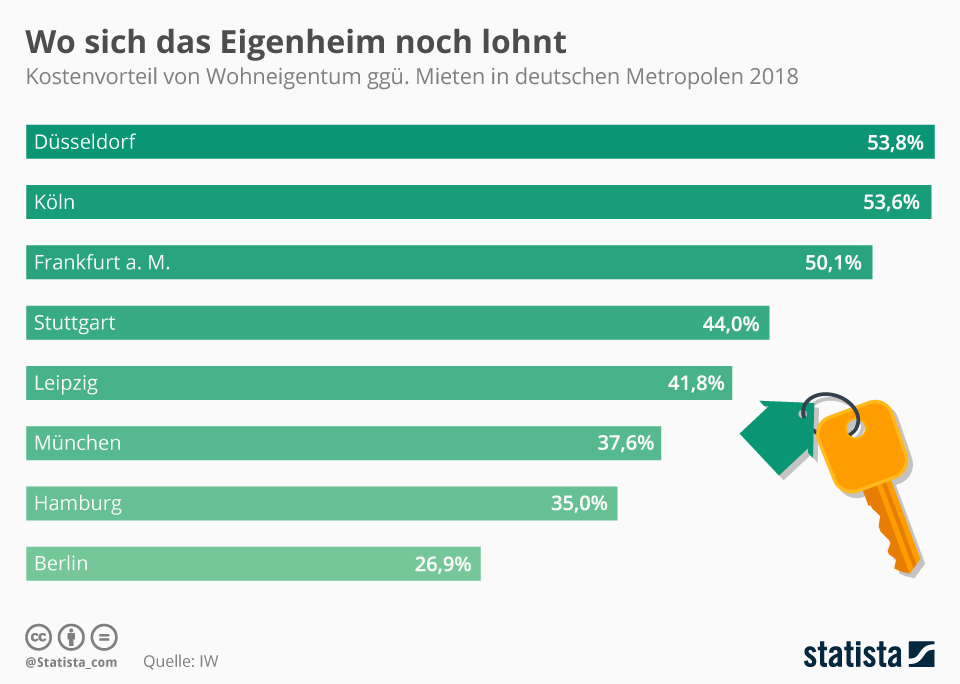 More statistics can be found at Statista
More statistics can be found at Statista
Exclusive houses and designer homes in Munich.
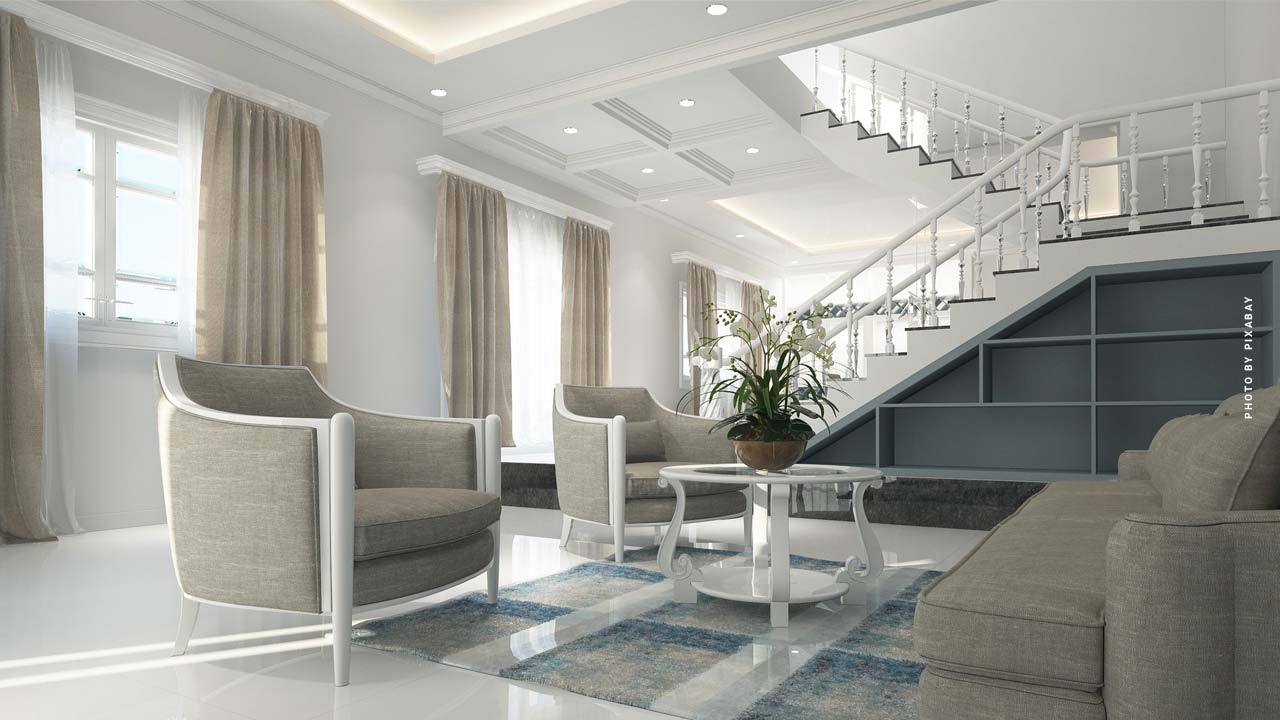
Exclusive freehold flat, in the middle of the Viktualienmarkt.
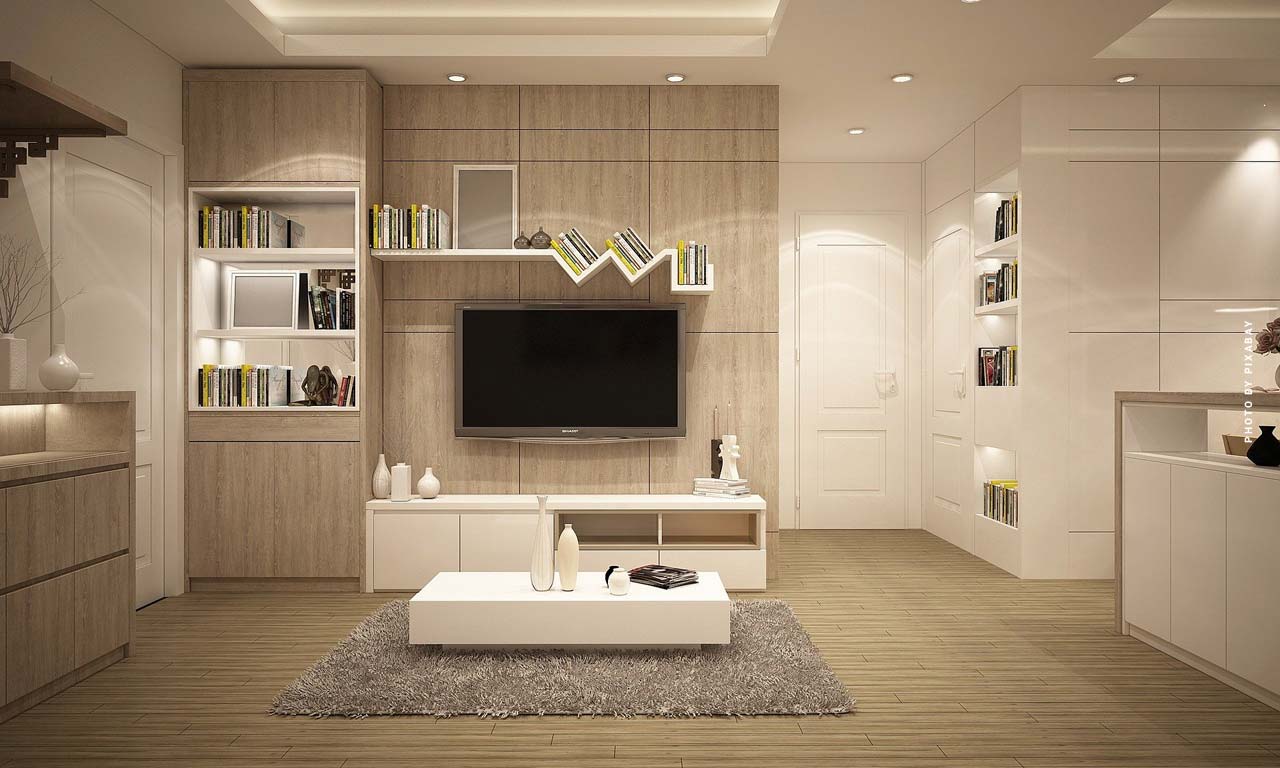
Number of sales of luxury homes
How many luxury properties are sold and bought in Germany each year? These statistics show how manageable the market is. Here you can see the number of sales of luxury homes in selected cities in Germany.
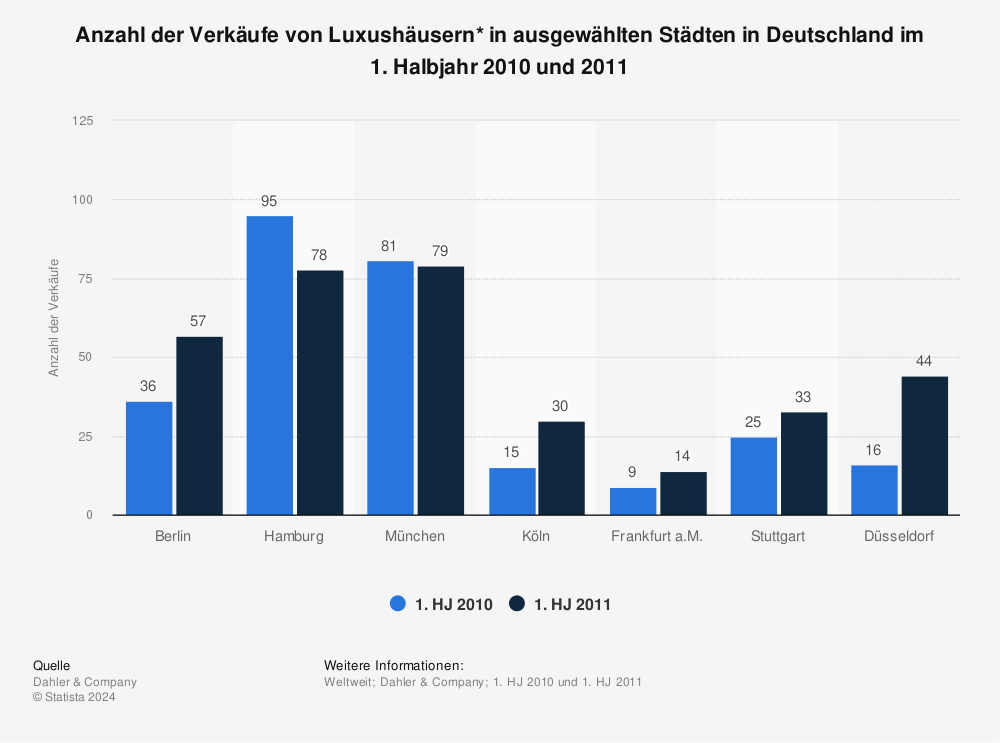
More statistics can be found at Statista
Data show for visualization last survey in the 1st half of 2010 and 2011.
Are there enough apartments built?
You can live in your own property yourself or you can rent it out. With the current housing shortage, this is a good prerequisite for increasing rental income. Because as always, supply and demand. The chart shows the share of annual building completions in 2016-2018 in the annual demand in the period 2016-2020.
- Hamburg and Düsseldorf Coverage / year at 86%
- Frankfurt am Main Coverage / year at 78%
- Berlin coverage / year at 73%
- Munich Coverage / year at 67%
- Stuttgart Coverage / year at 56%
- Cologne Coverage / year at 46%
 More statistics can be found at Statista
More statistics can be found at Statista
Rent
- Rental price for the perfect apartment
- Housing market: Current requests and offers
- Reality Check: Prices for first time rentals
- Residential building in Munich
- Service charges in comparison
- Rent a commercial property
- Rent office: Free areas and practices
- Rent office: compare prices
Rental price for the perfect apartment
As with the purchase of real estate, Munich is also at the top of the German-wide comparison of average rents. The chart shows the average rent for an apartment with 3 to 4 rooms (81 to 105 sqm).
- Munich – 1.500 Euro / month
- Frankfurt – 1.170 Euro / month
- Stuttgart – 1.080 Euro / month
- Hamburg – 1.030 Euro / month
- Düsseldorf – 900 Euro / month
- …
 More statistics can be found at Statista
More statistics can be found at Statista
Home market: Current requests and offers
The chart shows requests and offers for rental apartments in the 14 largest cities in Germany. 150,000 advertisements for rental apartments and the corresponding contact enquiries were evaluated.
 More statistics can be found at Statista
More statistics can be found at Statista
Reality Check: Prices for first time rentals
The chart shows the cold rents for first-time rentals in top 7 cities per square metre.
- Munich from 12.96 Euro to 17.42 Euro (+ 4.46 Euro)
- Stuttgart from 10.00 Euro to 14.21 Euro (+ 4.21 Euro)
- Frankfurt from 11.57 Euro to 14.18 Euro (+ 3.01 Euro)
- Hamburg from 12.00 Euro to 13.16 Euro (+ 1.16 Euro)
- Düsseldorf from 8.62 Euro to 12.55 Euro (+ 3.93 Euro)
- Berlin from 7.05 Euro to 12.40 Euro (+ 5.35 Euro)
- Cologne from 9.12 Euro to 12.39 Euro (+ 2.59 Euro)
- Comparable value: Germany from EUR 6.99 to EUR 9.58 (+ EUR 2.59)
 More statistics can be found at Statista
More statistics can be found at Statista
Residential building in Munich
Number of residential buildings in Munich in the years from 1980 to 2018 (in 1,000). The changes at a glance. Residential buildings increase in the last 10 years (2008 – 2018):
+ 9,000 residential units (+ 6.7%)
Residential buildings increase in the last 38 years (1980 – 2018), since survey:
+ 35,300 residential units (+ 32.9%)
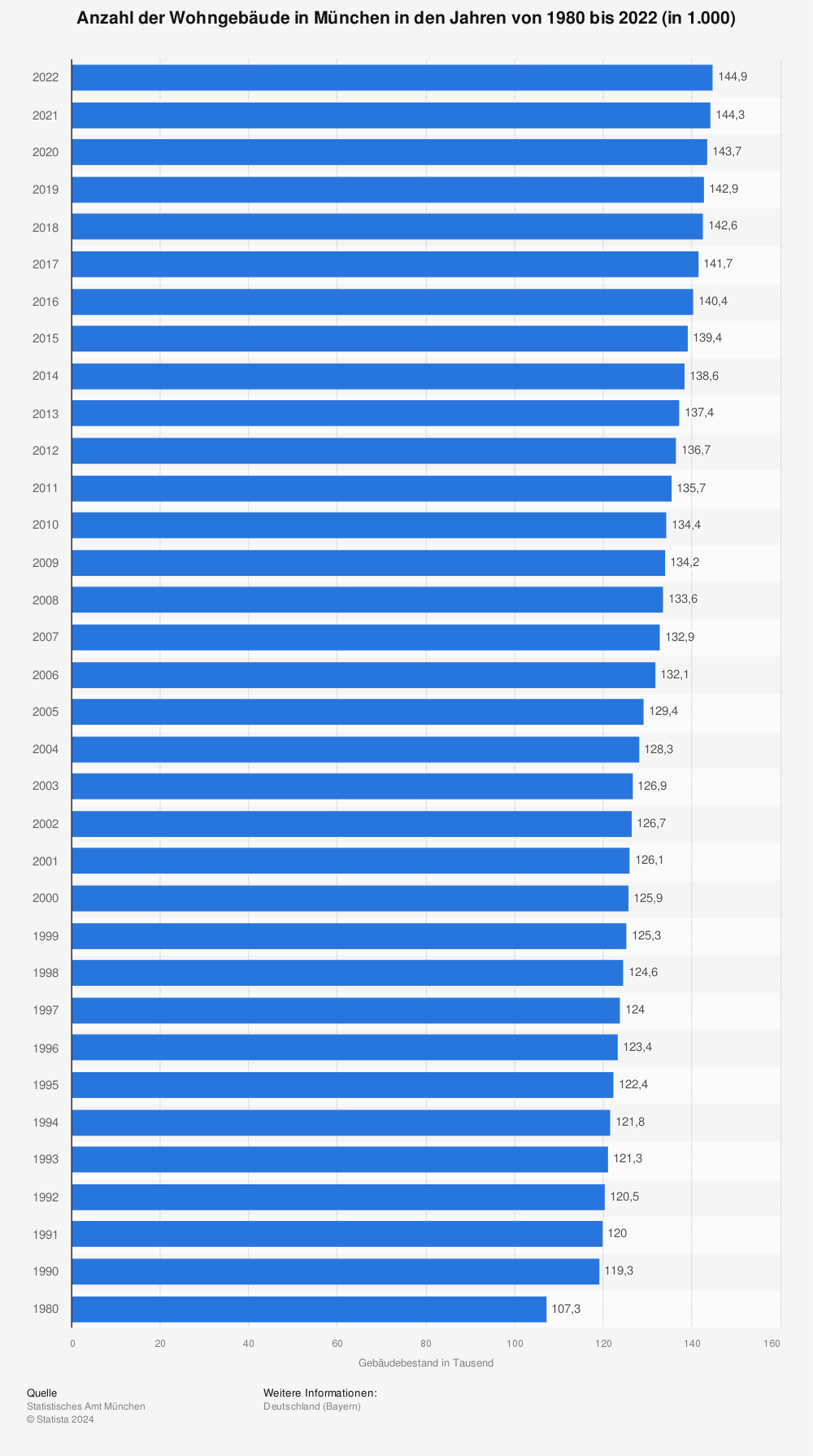
More statistics can be found at Statista
Service charges in comparison
The chart shows the total ancillary housing costs per year for a three-person household (in euros). The average in Germany is EUR 1,900.84 per year. The cheapest cities for ancillary costs are:
- Munich – 1.643,00 Euro / year (257,84 Euro less)
- Mainz – 1,686.02 Euro / year
- Hamburg – 1,682.40 Euro / year
- Kiel – 1.682,40 Euro / year
- Stuttgart – 1,729.74 Euro / year
 More statistics can be found at Statista
More statistics can be found at Statista
Commercial property rent
Location is everything! Especially for entrepreneurs and companies. In all major cities the rents for commercial properties are rising, only in Berlin the costs for the monthly rent are getting cheaper, and that in the best location. This chart shows the indexed costs for commercial real estate in the largest cities in Germany (Hamburg, Cologne, Frankfurt, Munich and Berlin) in comparison. A joint index takes into account shop rents in prime locations, shop rents in secondary centres, office rents in city centres and the prices for commercial properties.
- Hamburg
- Cologne
- Frankfurt
- Munich
- Berlin
 More statistics can be found at Statista
More statistics can be found at Statista
Rent office: Free areas and practices
Finding the perfect office – How does Munich compare to other German cities? How many free spaces and practices are there in relation to Stuttgart, Hamburg, Berlin & Co. This chart shows the proportion of vacant office space as a proportion of total office space in selected German cities in 2018.
- Frankfurt am Main – 6.8% free / 93.2% rented
- Düsseldorf – 6.4% vacant / 93.6% rented
- Hamburg – 3.6% vacant / 96.4% rented
- Cologne – 2.8% free / 97.2% rented
- Stuttgart – 2.3% free / 97.7% rented
- Munich – 1.8% free / 98.2% rented
- Berlin – 1.5% free / 98.5% rented
 More statistics can be found at Statista
More statistics can be found at Statista
Rent office: Prices in comparison
Where are office rents currently highest? Munich is at the top of the league, with current average office rents of 39.50 euros / m² and thus second place in the ranking of office rents in Germany. Here you can see the top rents for office space in German cities.
- Frankfurt – 45.50 Euro / m² (+ 23.1%)
- Berlin – 39.90 Euro / m² (+ 44.9%)
- Munich – 39.50 Euro / m² (+ 24.6%)
- Hamburg – 29.00 Euro / m² (+ 19.0%)
- Düsseldorf – 28.50 Euro / m² (+ 19.3%)
- Cologne – 25.50 Euro / m² (+ 20.4%)
- Stuttgart – 24.00 Euro / m² (+ 21.7%)
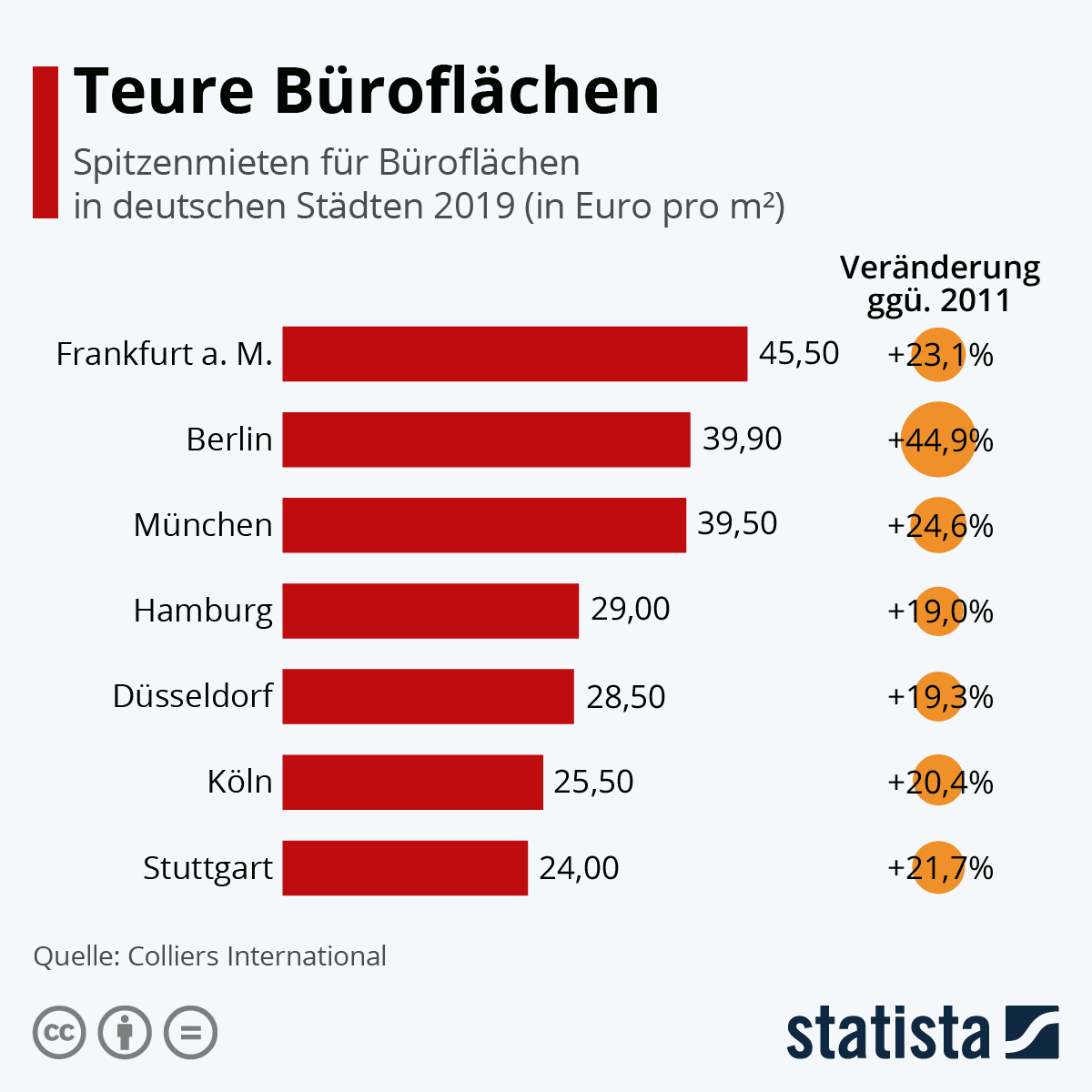 More statistics can be found at Statista
More statistics can be found at Statista
Munich at sunset.
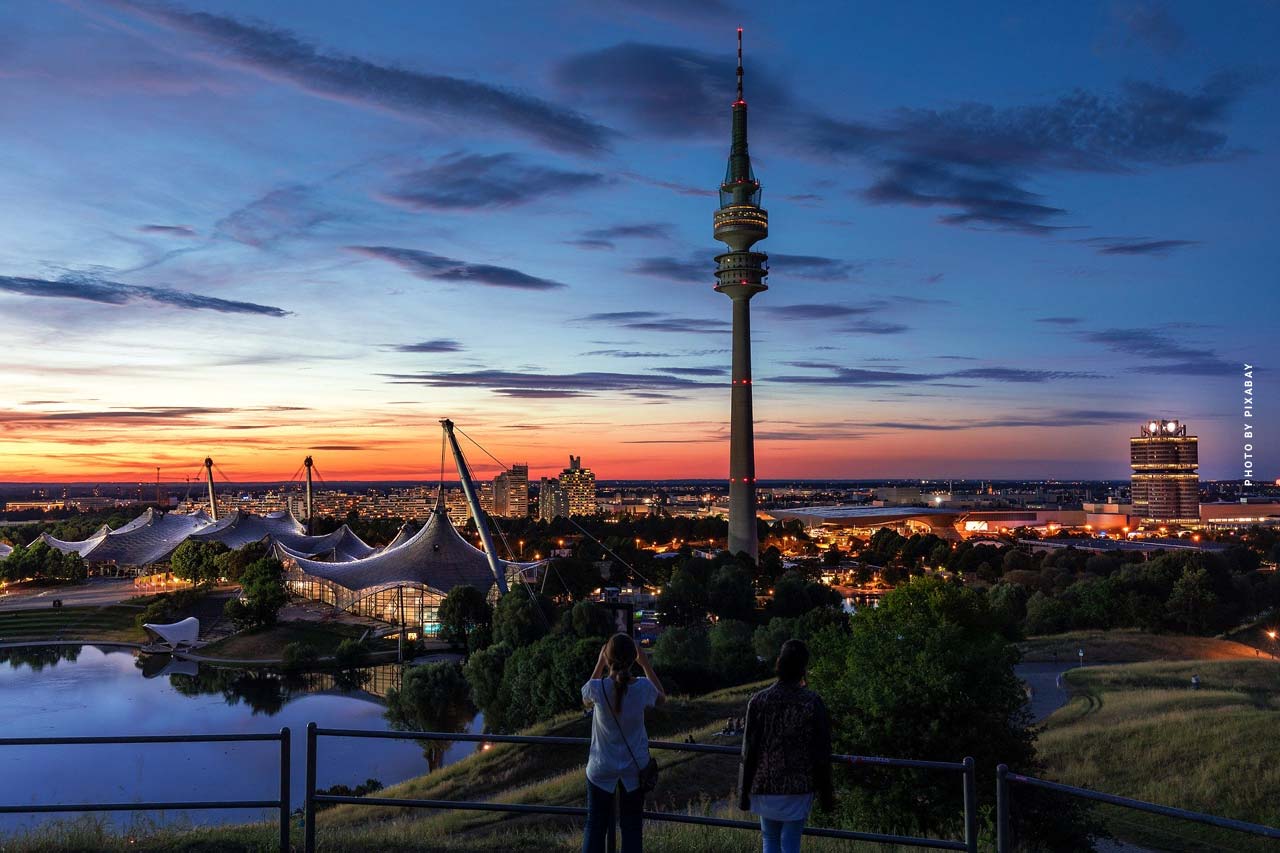
The romantic and typically European, Bavarian city centre.
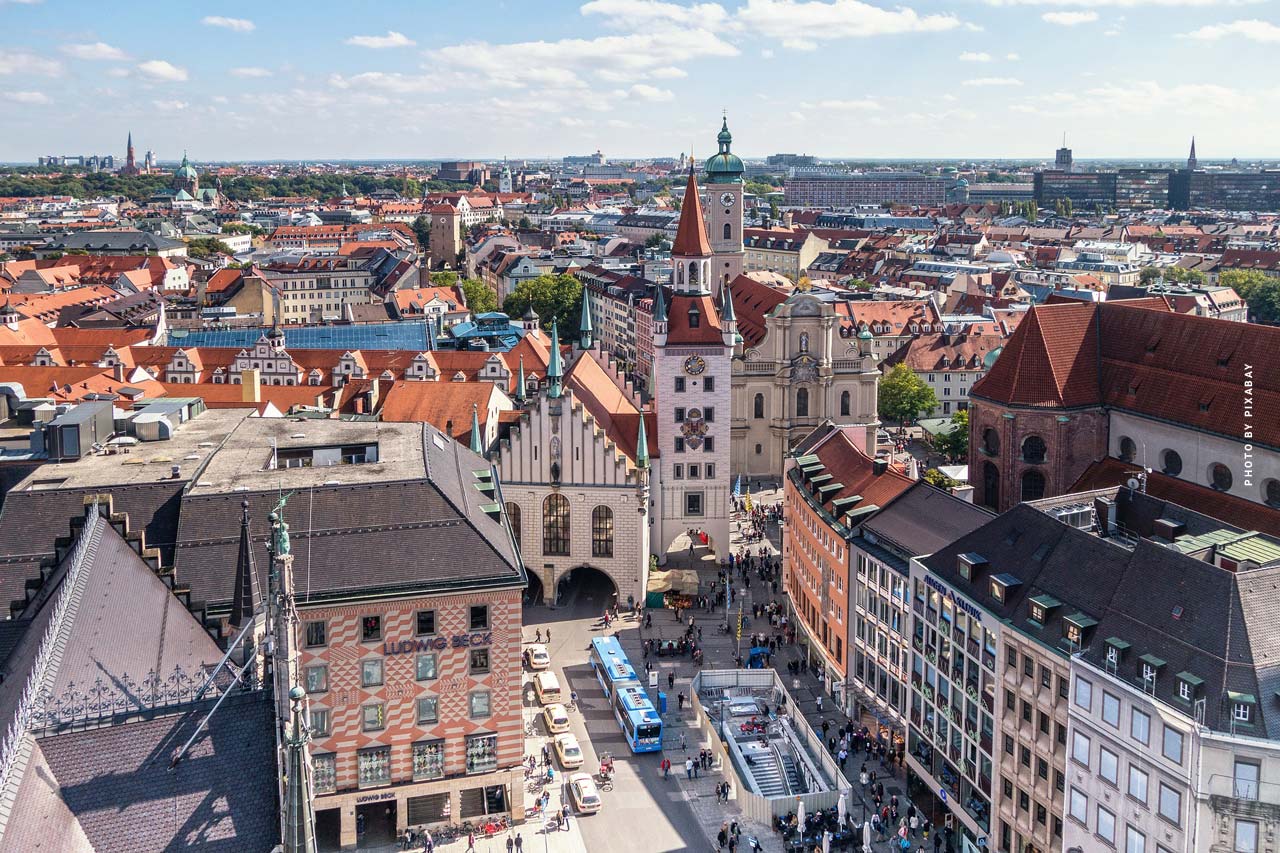
Living, economy, city and inhabitants
- City Map of Munich
- Private households: Forecast until 2030 in Bavaria
- Munich is family-friendly
- Comparison: Munich, Hamburg, Cologne and Berlin
City map Munich
Private households: forecast until 2030
How is Munich developing as a city and in Bavaria as a federal state? Here you can see the number of private households in Germany by federal state in 2018 and forecast for 2030 (in 1,000). This is an optimal situation for landlords as the demand for living space increases.
More statistics can be found at Statista
Munich is family-friendly
Do you consider your city to be family-friendly?
- Stuttgart – 65%
- Dortmund – 63%
- Bremen – 61%
- Hamburg – 60%
- Cologne – 60%
- Dusseldorf – 57%
- Munich – 56%
- Frankfurt – 51%
- Berlin – 48%
- Essen- 41%
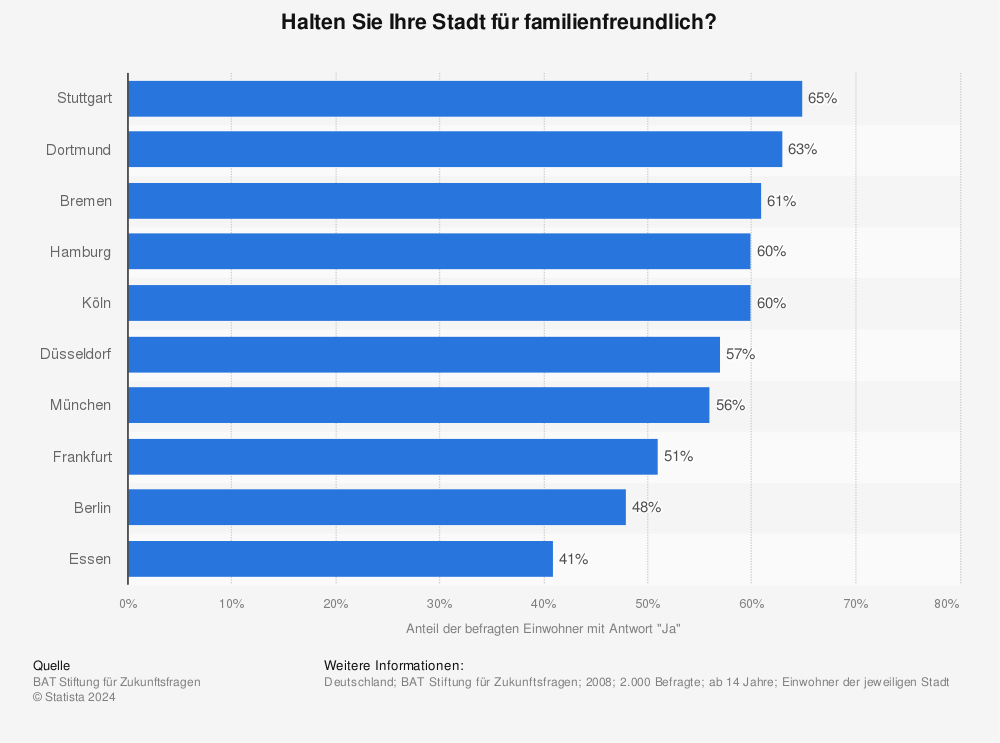
More statistics can be found at Statista
Comparison: Munich, Hamburg, Cologne and Berlin
Where do most of the inhabitants live? Here you see visualized, the 4 biggest cities in Germany. The graph shows the number of inhabitants in the German megacities on 31 December 2018, at the turn of the year 2018 / 2019.
- Berlin – 3,644,826 inhabitants
- Hamburg – 1,841,179 inhabitants (- 1,625,647 cf. Berlin)
- Munich – 1,471,508 inhabitants (- 2,173,318 see Berlin)
- Cologne – 1,085,664 inhabitants (- 2,559,162 cf. Berlin)
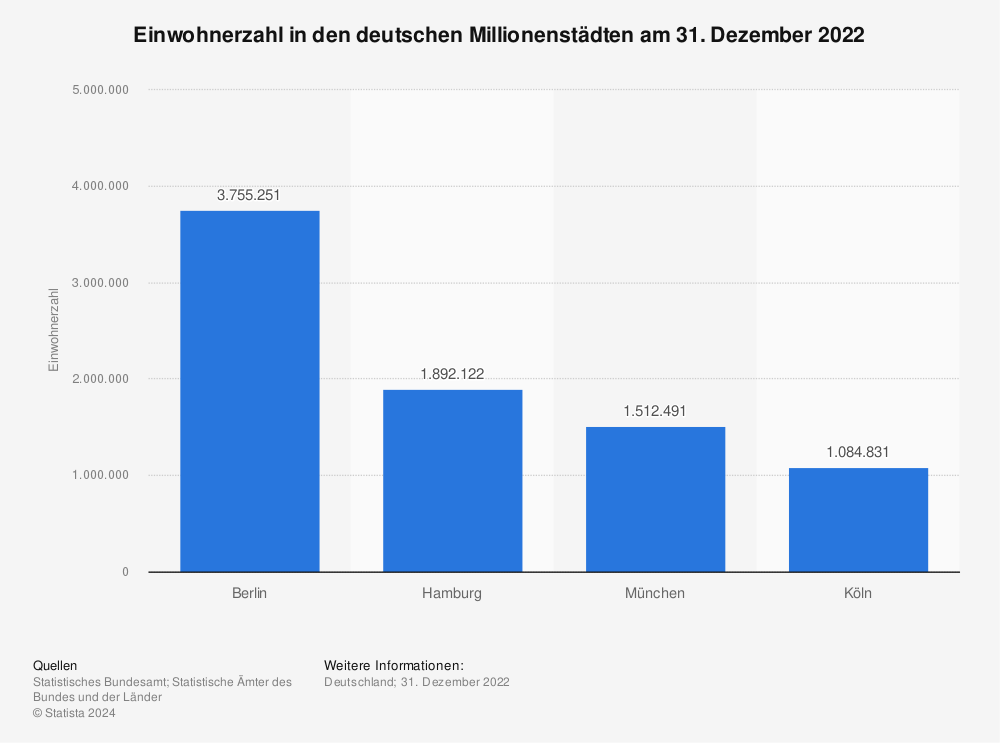
More statistics can be found at Statista
Buy in Germany
Tip! Read more about Buy an apartment: The 10 most expensive German cities.
- Ranking: Square meter prices for condominiums
- House price index: development of house prices
- Development of construction investments in Germany
- Ownership ratio in Germany
Ranking: Square meter prices for condominiums
Cities with the highest prices per square meter for condominiums in 2015 and 2019 (in euros per square meter).
- Munich – 8,993 Euro / square meter
- Frankfurt am Main – 6,701 Euro / square meter
- Stuttgart – 6,324 Euro / square meter
- Potsdam – 6.1.64 Euro / square meter
- Berlin – 5.578 Euro / square meter
- Hamburg – 5,507 Euro / square meter
- Düsseldorf – 5,470 Euro / square meter
- Erlangen – 5.416 Euro / square meter
- Regensburg – 5.411 Euro / square meter
- Freiburg im Breisgau – 5,349 Euro / square meter
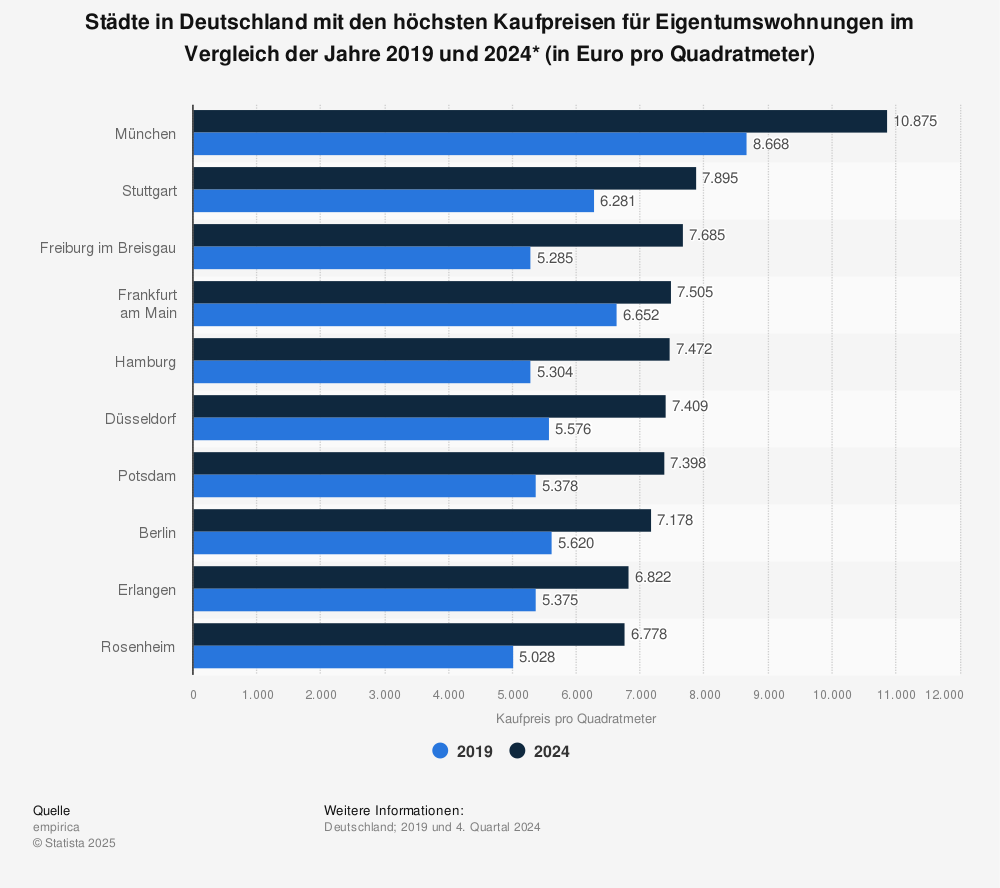
More statistics can be found at Statista
House price index: development of house prices
Development of house prices in Germany in the years from 2000 to 2018 (2015 = Index 100).
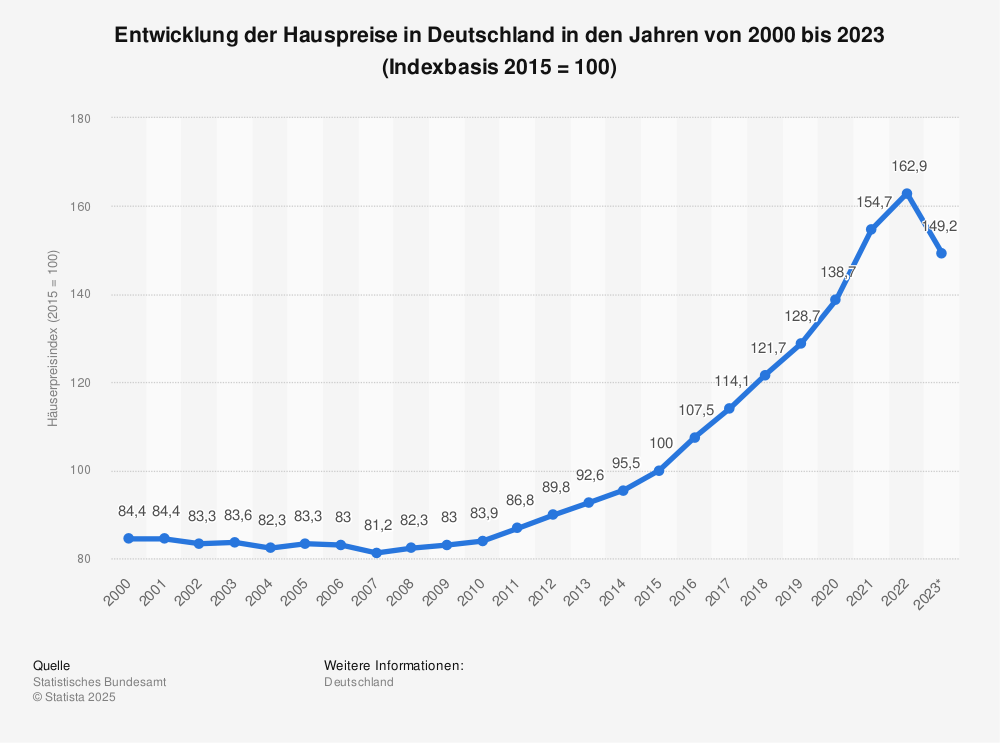
More statistics can be found at Statista
Development of construction investments in Germany
Development of construction investments in Germany in the years 2000 to 2016 (compared to previous year).
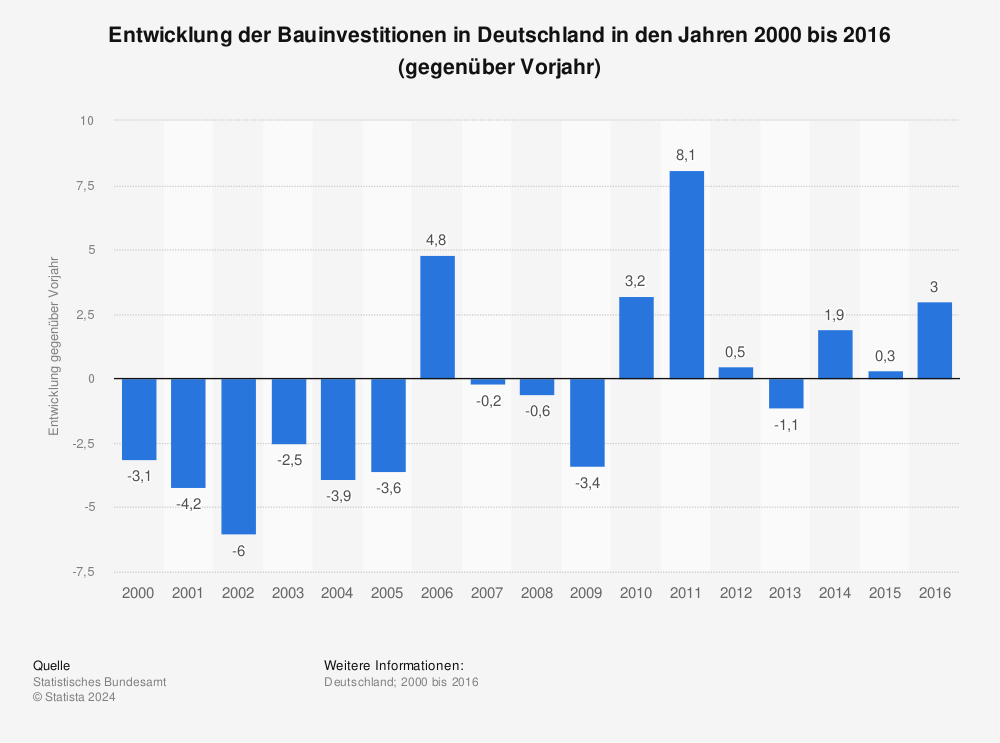
More statistics can be found at Statista
Ownership ratio in Germany
Ownership rate in Germany in the period from 1998 to 2018 by Länder
| 1998 | 2002 | 2006 | 2010 | 2014 | 2018 | |
|---|---|---|---|---|---|---|
| Baden-Württemberg | 48.3% | 49.3% | 49.1% | 52.8% | 51.3% | 52.6% |
| Bavaria | 47.6% | 48.9% | 46.4% | 51% | 50.6% | 51.4% |
| Berlin | 11% | 12.7% | 14.1% | 14.9% | 14.2% | 17.4% |
| Brandenburg | 35.5% | 39.8% | 39.6% | 46.2% | 46.4% | 47.8% |
| Bremen | 37.5% | 35.1% | 35.4% | 37.2% | 38.8% | 37.8% |
| Germany total | 40.9% | 42.6% | 41.6% | 45.7% | 45.5% | 46.5% |
| Hamburg | 20.3% | 21.9% | 20.2% | 22.6% | 22.6% | 23.9% |
| Hessen | 43.3% | 44.7% | 44.3% | 47.3% | 46.7% | 47.5% |
| Mecklenburg-Vorpommern | 32.2% | 35.9% | 33.2% | 37% | 38.9% | 41.1% |
| Lower Saxony | 48.9% | 51% | 49% | 54.5% | 54.7% | 54.2% |
| North Rhine-Westphalia | 37.4% | 39% | 38.7% | 43% | 42.8% | 43.7% |
| Rhineland-Palatinate | 55% | 55.7% | 54.3% | 58% | 57.6% | 58% |
| Saarland | 58.1% | 56.9% | 54.9% | 63.7% | 62.6% | 64.7% |
| Saxons | 28.7% | 31% | 29.5% | 33.7% | 34.1% | 34.6% |
| Saxony-Anhalt | 36.5% | 39.6% | 37.9% | 42.7% | 42.4% | 45.1% |
| Schleswig-Holstein | 46.8% | 49.4% | 47.1% | 49.7% | 51.5% | 53.3% |
| Thuringia | 39.2% | 41.8% | 40.6% | 45.5% | 43.8% | 45.3% |
All further information on statistics can be found at Statista
Rentals in Germany
Tip! Read more about Rent an apartment: The 10 most expensive German cities.
- Development of the rental price index
- Ranking: Rents for apartments
- Number of newly constructed residential buildings
Development of the rental price index
Development of the rent price index for Germany in the years from 1995 to 2019 (2015 = Index 100)
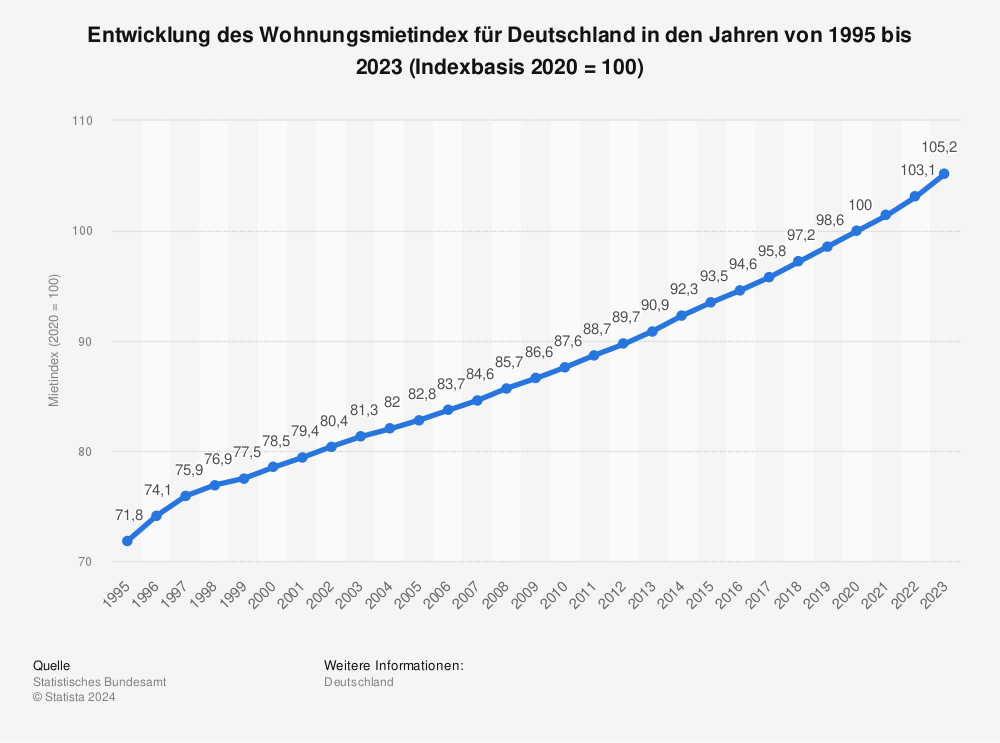
More statistics can be found at Statista
Ranking: Rents for apartments
Cities with the highest rental prices for apartments in Germany in the 4th quarter of 2019(in euros per square metre)
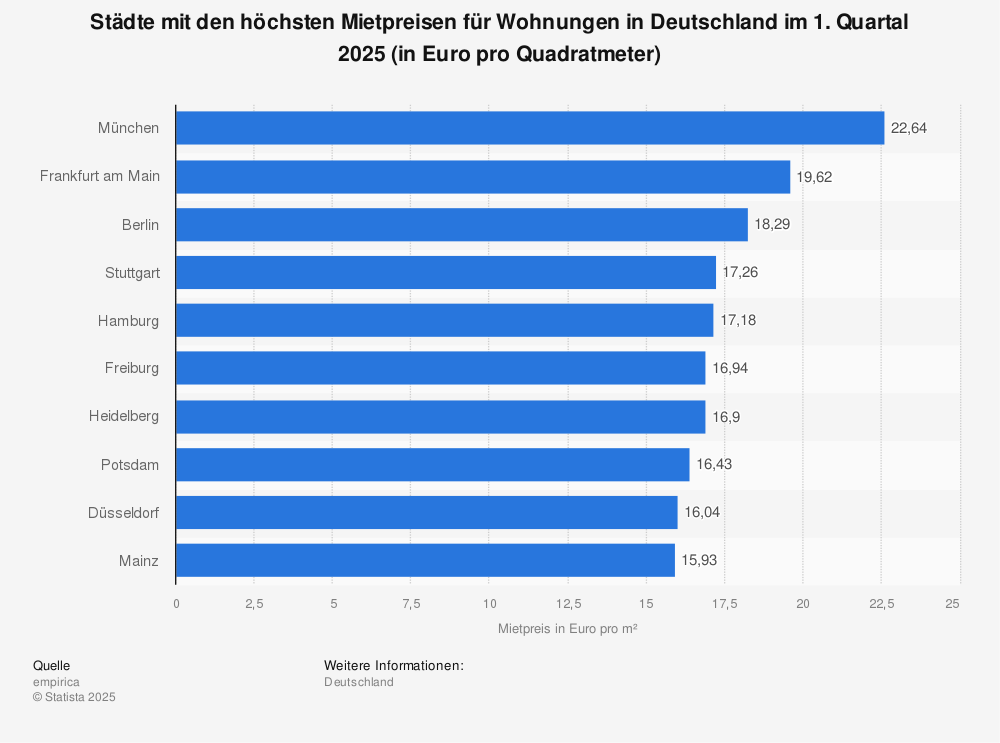
More statistics can be found at Statista
Number of newly constructed residential buildings
New construction: Where are new apartments being built? Number of newly constructed residential buildings in Germany by federal state in 2017 and 2018 (in 1,000).

